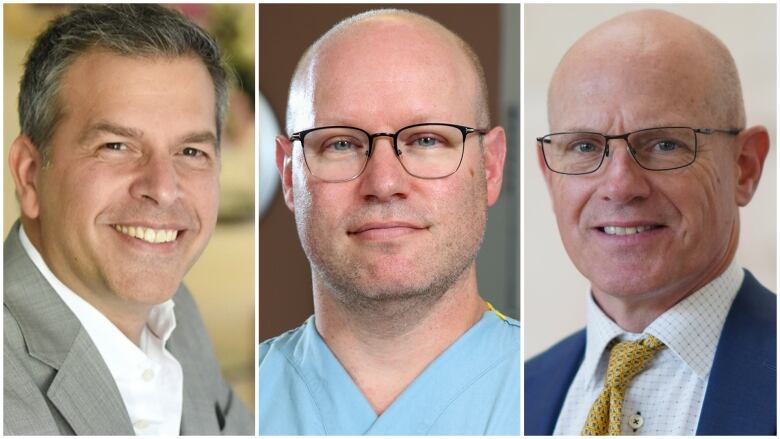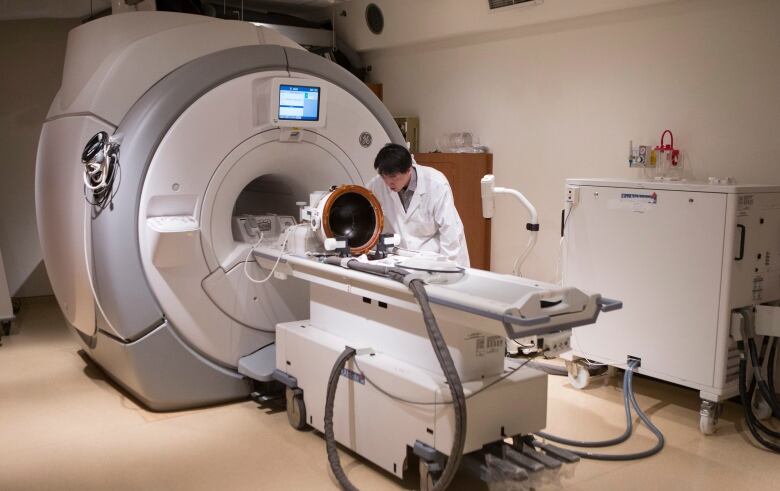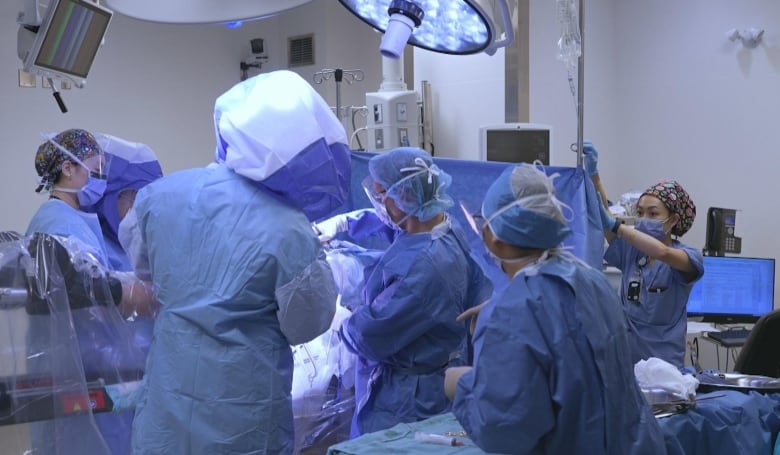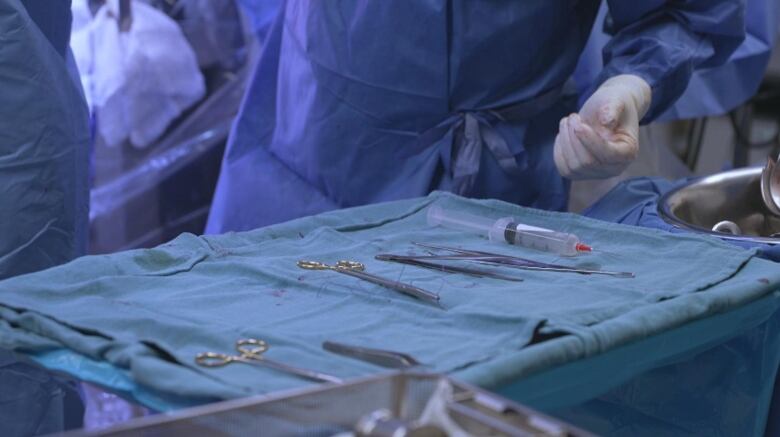Why these doctors support Doug Ford's plan for private surgical clinics
Ontario expanding OHIP-covered procedures done outside hospitals, including hip and knee replacements, MRIs

The Doug Ford government is poised to give independent clinics a greater role in performing surgeries and scans currently done in hospitals, and some doctors are speaking out in favour of the controversial plan.
Ontario's Ministry of Health is currently laying the groundwork for the creation of what it calls community surgical and diagnostic centres, to open later this year.
The centres will perform OHIP-covered procedures such as hip and knee replacements and MRI scans. The clinics could be privately owned.
Ford and Health Minister Sylvia Jones insist that no Ontarian will have to pay for surgeries or scans in these facilities. Despite that,the government's plan is drawing criticism for allowing the private sector to profit from the publicly funded health system.
CBC News did in-depth interviews with three Ontario physicians who believe that criticism is misplaced. They argue creating these clinics will increase the availability of procedures that typically have months-long waiting lists, making life better for patients.
WATCH |Why some doctors support Doug Ford's plan for private surgical clinics:
Shorter waits for patients
The most fundamental reason the three physicians put forward for supporting the creation of the clinics is that they predict they will shorten the time that patients spend waiting for procedures.
"When you restrict surgeries to being only done in the hospital, it limits the access for patients," said Dr. Brian Rotenberg, a surgical specialist in otolaryngology (ear, nose and throat) , who also runs Surgical Services Ltd., a consulting firm with expertise in launching independent surgical clinics.
Dr. David Jacobs, a radiologist andpresident of the Ontario Association of Radiologists, says independent clinics will bring efficiencies in the cost of delivering care and reducing wait times.
"We are lacking access to care in Ontario," said Jacobs. "We have to decide whether we are going to take an ideological approach to healthcare or whether we're going to take a pragmatic approach."
Dr. Bob Litchfield, an orthopedic surgeonand aprofessor of surgery at Western University, says Ontario's health system provides timely care for such things as trauma and cancer, but falls down when it comes to many other procedures.
"I think we just should just take that on as a challenge to really look in the mirror and say can we do better," he said.

Other countries
The latest Canadian data shows Ontario has the best record among the provinces on patients getting hip and knee replacements within the national benchmark of six months, and the shortest median wait for an MRI.
However, Canadianwait times (including Ontario's) for such procedures are significantly longer than what patients face in other countries with universal healthcare systems.
The doctors point to such countries as the Netherlands, Sweden and Australia, where publicly funded surgeries and scans are delivered in private sector clinics outside of hospitals.
"This model of care does exist all around the world," said Rotenberg. "We're way behind the times."
Jacobs says comparable health systems in other countries provide patients better access to medical procedures and show better population-wide health outcomes.
"When these systems were facing very similar problems to what we're facing in Ontario, in terms of an inability to service a growing population and an aging population, they decided to look at private delivery of publicly funded care," said Jacobs.
"We need to take the lessons from those systems and apply them in Ontario," he said.

Litchfield says the private delivery of publicly funded healthcare in those systems takes pressure off public hospitals.
"I think there's much to be learned by looking at other healthcare systems and not be scared by them," he said.
Will it strain healthcare staffing?
One of the fundamental arguments made by critics of Ontario's plan is that creating new operating rooms in independent clinics doesn't actually increase the number of surgeons, nurses and medical technicians needed to perform those operations.
They argue that Ontario patients are waiting too long for surgery because of a scarcity of health care professionals, and ask: when surgeons and nurses leave hospitals to work at independent clinics, how will that improve things?
The doctors say the vast bulk of Ontario surgeons have the potential to spend more time during their weeks actually performing surgery, but are limited by the availability of staffed operating rooms.
"We just don't have enough OR spaces or [surgical] grid time within the public system to allow surgeons to really maximize what they should be doing," Litchfield said.

He also suggests the creation of the clinics will help attract more people to the healthcare field by providing work environments that are different from hospitals.
Rotenberg acknowledges that Ontario's health system is facing a real staffing crunch.
"I'm aware of colleagues who have had surgeries cancelled because there are literally no nursing staff available to support their operation," he said.
He adds that other countries that have adopted the independent clinic model also faced similar human resources challenges and have managed to solve them.
Hospital not always best place
There's a broad consensus in the health system that some procedures could be performed more efficiently in specialized outpatient clinics than in hospitalswith equal or even better quality of care.
A clinic that specializes only in, for instance, hip replacements, can perform more of them on a given day than a general hospital, although hospitals like Humber River in Toronto have made great strides in efficiency.
WATCH |How Humber River Hospital does hip replacement surgery in 35 minutes:
Litchfield says the cases that are best suited to be performed in the clinics involve operations on healthier patients who don't need the full infrastructure of a hospital when undergoing day surgery.
"Hip and knee [replacements] fit perfectly into this it is basically a very repetitious procedure," Litchfield said.
Canada has among the lowest number of acute care hospital beds per capita among the world's wealthier countries and among the highest occupancy rates of those beds, according to data from the Organization for Economic Cooperation and Development.
Running so close to capacity means that a surge in demand often forces hospitals to postpone scheduled surgeries, lengthening patient wait times. Independent clinics specializing in those procedures would not face that problem.
"At these outpatient clinics, what they're doing is they're taking a lot of the grunt work out of the hospital, and letting the hospital concentrate on what it needs to concentrate on, which is complex care," said Jacobs.
"We can take a tremendous amount of pressure off of the hospitals in many different areas," he said. "The sky's the limit as to what we can do."

How will it work?
The government has yet to specify how many surgical and diagnostic centres will be created, where they'll be located, or how exactly they'll be funded.
"The expansion of community surgical and diagnostic centres has always been about providing more publicly funded procedures in areas of greatest need, rather than about achieving a certain number of clinics," said Jones's spokesperson, Hannah Jensen,in an email to CBC News.
"Ontario Health is currently in the process of defining specific criteria for priority areas and which regions will be priority areas for the expansion," Jensen said. "The Ministry is currently preparing for the call for applications to go out in late spring."
Despite the shortage of specifics so far, Rotenberg says he's heard plenty of interest in creating these clinics.
"There are surgeons from almost every specialty you can think of who want to consider opening up a site," he said.
One detail that Jones has already announced: oversight of the independent centres will be done by Accreditation Canada, a non-profit agency that assesses whether health facilities meet standards in such areas as preventing infections and operating medical labs.














_(720p).jpg)


 OFFICIAL HD MUSIC VIDEO.jpg)
.jpg)



























































































